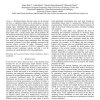74 search results - page 9 / 15 » Mobile-Agent Coordination Models for Internet Applications |
OHS
2000
Springer
13 years 11 months ago
2000
Springer
Abstract. Structural computing is a new paradigm for developing applications in new domains. One of its benefits is that adaptation of behavior--as a consequence of changes of the ...
SIGCOMM
2004
ACM
14 years 23 days ago
2004
ACM
Large-scale Internet applications can benefit from an ability to predict round-trip times to other hosts without having to contact them first. Explicit measurements are often un...
ECOWS
2007
Springer
13 years 11 months ago
2007
Springer
Web services are self-contained, modular units of application logic which provide business functionality to other applications via Internet connections. Several models have been u...
DSRT
2009
IEEE
13 years 5 months ago
2009
IEEE
Predicting latency between nodes on the internet can have a significant impact on the performance of many services that use latency distances among nodes as a decision making input...
WWW
2003
ACM
14 years 8 months ago
2003
ACM
The construction of composite Web Services from service fragments requires semantic descriptions of service offers and service requests. We propose the use of dependencies as a mo...

